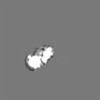[English] 日本語
 Yorodumi
Yorodumi- EMDB-4736: Structural basis of Cullin-2 RING E3 ligase regulation by the COP... -
+ Open data
Open data
- Basic information
Basic information
| Entry | Database: EMDB / ID: EMD-4736 | |||||||||
|---|---|---|---|---|---|---|---|---|---|---|
| Title | Structural basis of Cullin-2 RING E3 ligase regulation by the COP9 signalosome | |||||||||
 Map data Map data | Structural basis of Cullin-2 RING E3 ligase regulation by the COP9 signalosome | |||||||||
 Sample Sample |
| |||||||||
 Keywords Keywords | Cullin-Ring E3 Ligase COP9 Signalosome Neddylation / LIGASE | |||||||||
| Function / homology |  Function and homology information Function and homology informationnucleotide-excision repair factor 4 complex / COP9 signalosome assembly / trophectodermal cell proliferation / macrophage migration inhibitory factor binding / global genome nucleotide-excision repair / regulation of IRE1-mediated unfolded protein response / exosomal secretion / GTPase inhibitor activity / deNEDDylase activity / protein deneddylation ...nucleotide-excision repair factor 4 complex / COP9 signalosome assembly / trophectodermal cell proliferation / macrophage migration inhibitory factor binding / global genome nucleotide-excision repair / regulation of IRE1-mediated unfolded protein response / exosomal secretion / GTPase inhibitor activity / deNEDDylase activity / protein deneddylation / regulation of protein neddylation / activation of NF-kappaB-inducing kinase activity / eukaryotic translation initiation factor 3 complex / regulation of cellular response to hypoxia / negative regulation of beige fat cell differentiation / cullin-RING-type E3 NEDD8 transferase / negative regulation of receptor signaling pathway via JAK-STAT / RHOBTB3 ATPase cycle / NEDD8 transferase activity / COP9 signalosome / cullin-RING ubiquitin ligase complex / Cul7-RING ubiquitin ligase complex / cellular response to chemical stress / transcription elongation factor activity / Loss of Function of FBXW7 in Cancer and NOTCH1 Signaling / target-directed miRNA degradation / elongin complex / protein K27-linked ubiquitination / positive regulation of protein autoubiquitination / RNA polymerase II transcription initiation surveillance / protein neddylation / Replication of the SARS-CoV-1 genome / NEDD8 ligase activity / Hydrolases; Acting on peptide bonds (peptidases) / RHOBTB1 GTPase cycle / metal-dependent deubiquitinase activity / VCB complex / negative regulation of response to oxidative stress / regulation of JNK cascade / regulation of DNA damage response, signal transduction by p53 class mediator / Cul5-RING ubiquitin ligase complex / intracellular membraneless organelle / inner cell mass cell proliferation / ubiquitin-ubiquitin ligase activity / ubiquitin-dependent protein catabolic process via the C-end degron rule pathway / SCF ubiquitin ligase complex / TP53 Regulates Transcription of DNA Repair Genes / Cul2-RING ubiquitin ligase complex / negative regulation of type I interferon production / SCF-dependent proteasomal ubiquitin-dependent protein catabolic process / Cul3-RING ubiquitin ligase complex / SUMOylation of ubiquitinylation proteins / negative regulation of mitophagy / Cul4A-RING E3 ubiquitin ligase complex / Cul4-RING E3 ubiquitin ligase complex / Prolactin receptor signaling / Cul4B-RING E3 ubiquitin ligase complex / ubiquitin ligase complex scaffold activity / Antigen processing: Ubiquitination & Proteasome degradation / negative regulation of transcription elongation by RNA polymerase II / Pausing and recovery of Tat-mediated HIV elongation / Tat-mediated HIV elongation arrest and recovery / response to light stimulus / skeletal muscle cell differentiation / cullin family protein binding / HIV elongation arrest and recovery / Pausing and recovery of HIV elongation / protein monoubiquitination / negative regulation of signal transduction / Tat-mediated elongation of the HIV-1 transcript / Formation of HIV-1 elongation complex containing HIV-1 Tat / site of DNA damage / : / Formation of HIV elongation complex in the absence of HIV Tat / response to UV / protein K48-linked ubiquitination / ubiquitin-like ligase-substrate adaptor activity / RNA Polymerase II Transcription Elongation / Formation of RNA Pol II elongation complex / signal transduction in response to DNA damage / JNK cascade / Nuclear events stimulated by ALK signaling in cancer / negative regulation of TORC1 signaling / transcription-coupled nucleotide-excision repair / translation initiation factor activity / RNA Polymerase II Pre-transcription Events / positive regulation of TORC1 signaling / regulation of cellular response to insulin stimulus / negative regulation of insulin receptor signaling pathway / intrinsic apoptotic signaling pathway / negative regulation of autophagy / post-translational protein modification / protein serine/threonine kinase binding / T cell activation / negative regulation of canonical NF-kappaB signal transduction / Regulation of BACH1 activity / transcription corepressor binding / Degradation of CRY and PER proteins / TP53 Regulates Transcription of DNA Repair Genes / nucleotide-excision repair Similarity search - Function | |||||||||
| Biological species |  Homo sapiens (human) Homo sapiens (human) | |||||||||
| Method | single particle reconstruction / cryo EM / Resolution: 8.4 Å | |||||||||
 Authors Authors | Morris EP / Faull SV | |||||||||
| Funding support |  United Kingdom, 1 items United Kingdom, 1 items
| |||||||||
 Citation Citation |  Journal: Nat Commun / Year: 2019 Journal: Nat Commun / Year: 2019Title: Structural basis of Cullin 2 RING E3 ligase regulation by the COP9 signalosome. Authors: Sarah V Faull / Andy M C Lau / Chloe Martens / Zainab Ahdash / Kjetil Hansen / Hugo Yebenes / Carla Schmidt / Fabienne Beuron / Nora B Cronin / Edward P Morris / Argyris Politis /    Abstract: Cullin-Ring E3 Ligases (CRLs) regulate a multitude of cellular pathways through specific substrate receptors. The COP9 signalosome (CSN) deactivates CRLs by removing NEDD8 from activated Cullins. ...Cullin-Ring E3 Ligases (CRLs) regulate a multitude of cellular pathways through specific substrate receptors. The COP9 signalosome (CSN) deactivates CRLs by removing NEDD8 from activated Cullins. Here we present structures of the neddylated and deneddylated CSN-CRL2 complexes by combining single-particle cryo-electron microscopy (cryo-EM) with chemical cross-linking mass spectrometry (XL-MS). These structures suggest a conserved mechanism of CSN activation, consisting of conformational clamping of the CRL2 substrate by CSN2/CSN4, release of the catalytic CSN5/CSN6 heterodimer and finally activation of the CSN5 deneddylation machinery. Using hydrogen-deuterium exchange (HDX)-MS we show that CRL2 activates CSN5/CSN6 in a neddylation-independent manner. The presence of NEDD8 is required to activate the CSN5 active site. Overall, by synergising cryo-EM with MS, we identify sensory regions of the CSN that mediate its stepwise activation and provide a framework for understanding the regulatory mechanism of other Cullin family members. | |||||||||
| History |
|
- Structure visualization
Structure visualization
| Movie |
 Movie viewer Movie viewer |
|---|---|
| Structure viewer | EM map:  SurfView SurfView Molmil Molmil Jmol/JSmol Jmol/JSmol |
| Supplemental images |
- Downloads & links
Downloads & links
-EMDB archive
| Map data |  emd_4736.map.gz emd_4736.map.gz | 38 MB |  EMDB map data format EMDB map data format | |
|---|---|---|---|---|
| Header (meta data) |  emd-4736-v30.xml emd-4736-v30.xml emd-4736.xml emd-4736.xml | 26.7 KB 26.7 KB | Display Display |  EMDB header EMDB header |
| Images |  emd_4736.png emd_4736.png | 119.7 KB | ||
| Filedesc metadata |  emd-4736.cif.gz emd-4736.cif.gz | 8.8 KB | ||
| Archive directory |  http://ftp.pdbj.org/pub/emdb/structures/EMD-4736 http://ftp.pdbj.org/pub/emdb/structures/EMD-4736 ftp://ftp.pdbj.org/pub/emdb/structures/EMD-4736 ftp://ftp.pdbj.org/pub/emdb/structures/EMD-4736 | HTTPS FTP |
-Related structure data
| Related structure data |  6r6hMC  4739C  4741C  4742C  4744C  6r7fC  6r7hC  6r7iC  6r7nC M: atomic model generated by this map C: citing same article ( |
|---|---|
| Similar structure data |
- Links
Links
| EMDB pages |  EMDB (EBI/PDBe) / EMDB (EBI/PDBe) /  EMDataResource EMDataResource |
|---|---|
| Related items in Molecule of the Month |
- Map
Map
| File |  Download / File: emd_4736.map.gz / Format: CCP4 / Size: 103 MB / Type: IMAGE STORED AS FLOATING POINT NUMBER (4 BYTES) Download / File: emd_4736.map.gz / Format: CCP4 / Size: 103 MB / Type: IMAGE STORED AS FLOATING POINT NUMBER (4 BYTES) | ||||||||||||||||||||||||||||||||||||||||||||||||||||||||||||||||||||
|---|---|---|---|---|---|---|---|---|---|---|---|---|---|---|---|---|---|---|---|---|---|---|---|---|---|---|---|---|---|---|---|---|---|---|---|---|---|---|---|---|---|---|---|---|---|---|---|---|---|---|---|---|---|---|---|---|---|---|---|---|---|---|---|---|---|---|---|---|---|
| Annotation | Structural basis of Cullin-2 RING E3 ligase regulation by the COP9 signalosome | ||||||||||||||||||||||||||||||||||||||||||||||||||||||||||||||||||||
| Projections & slices | Image control
Images are generated by Spider. | ||||||||||||||||||||||||||||||||||||||||||||||||||||||||||||||||||||
| Voxel size | X=Y=Z: 1.06 Å | ||||||||||||||||||||||||||||||||||||||||||||||||||||||||||||||||||||
| Density |
| ||||||||||||||||||||||||||||||||||||||||||||||||||||||||||||||||||||
| Symmetry | Space group: 1 | ||||||||||||||||||||||||||||||||||||||||||||||||||||||||||||||||||||
| Details | EMDB XML:
CCP4 map header:
| ||||||||||||||||||||||||||||||||||||||||||||||||||||||||||||||||||||
-Supplemental data
- Sample components
Sample components
+Entire : Cullin-Ring E3 Ligases (CRLs) complexes with neddylated COP9 sign...
+Supramolecule #1: Cullin-Ring E3 Ligases (CRLs) complexes with neddylated COP9 sign...
+Macromolecule #1: COP9 signalosome complex subunit 1
+Macromolecule #2: COP9 signalosome complex subunit 2
+Macromolecule #3: COP9 signalosome complex subunit 3
+Macromolecule #4: COP9 signalosome complex subunit 4
+Macromolecule #5: COP9 signalosome complex subunit 5
+Macromolecule #6: COP9 signalosome complex subunit 6
+Macromolecule #7: COP9 signalosome complex subunit 8
+Macromolecule #8: Cullin-2
+Macromolecule #9: Elongin-B
+Macromolecule #10: ELOC_HUMAN
+Macromolecule #11: RBX1_HUMAN
+Macromolecule #12: von Hippel-Lindau disease tumor suppressor
+Macromolecule #13: COP9 signalosome complex subunit 7b
+Macromolecule #14: ZINC ION
-Experimental details
-Structure determination
| Method | cryo EM |
|---|---|
 Processing Processing | single particle reconstruction |
| Aggregation state | particle |
- Sample preparation
Sample preparation
| Buffer | pH: 7.5 Details: 15 mM Hepes pH 7.5 100 mM NaCl 0.5 mM DTT 1% glycerol |
|---|---|
| Vitrification | Cryogen name: NITROGEN / Instrument: FEI VITROBOT MARK IV |
- Electron microscopy
Electron microscopy
| Microscope | FEI TITAN KRIOS |
|---|---|
| Specialist optics | Energy filter - Name: GIF Bioquantum / Energy filter - Slit width: 30 eV |
| Image recording | Film or detector model: GATAN K2 QUANTUM (4k x 4k) / Detector mode: COUNTING / Average electron dose: 45.0 e/Å2 |
| Electron beam | Acceleration voltage: 300 kV / Electron source:  FIELD EMISSION GUN FIELD EMISSION GUN |
| Electron optics | C2 aperture diameter: 100.0 µm / Illumination mode: FLOOD BEAM / Imaging mode: BRIGHT FIELD / Cs: 2.7 mm / Nominal defocus max: 3.0 µm / Nominal defocus min: 1.8 µm / Nominal magnification: 47170 |
| Sample stage | Specimen holder model: FEI TITAN KRIOS AUTOGRID HOLDER / Cooling holder cryogen: NITROGEN |
| Experimental equipment |  Model: Titan Krios / Image courtesy: FEI Company |
- Image processing
Image processing
| Startup model | Type of model: NONE |
|---|---|
| Final reconstruction | Applied symmetry - Point group: C1 (asymmetric) / Resolution.type: BY AUTHOR / Resolution: 8.4 Å / Resolution method: FSC 0.143 CUT-OFF / Number images used: 24040 |
| Initial angle assignment | Type: RANDOM ASSIGNMENT |
| Final angle assignment | Type: MAXIMUM LIKELIHOOD |
 Movie
Movie Controller
Controller


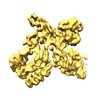
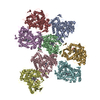
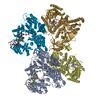
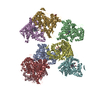
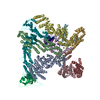
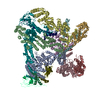

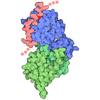



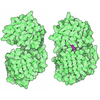


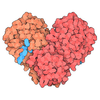




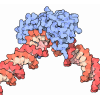

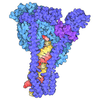
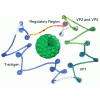
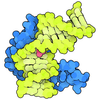
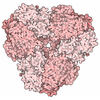

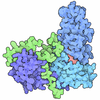

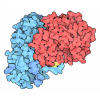
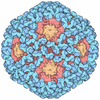

 Z (Sec.)
Z (Sec.) Y (Row.)
Y (Row.) X (Col.)
X (Col.)









